Fort McMurray Wildfire Continues to Burn
THUNDER BAY – Fire fighters from Northwestern Ontario are headed west to Alberta to fight the wild fires that have caused serious damage to Fort McMurray and other parts of Alberta.
The devastation to Fort McMurray has galvanized people from across Canada to help.


The federal government and provincial government have united to help. Matching donations will be implemented to help people recover from the loses they have suffered.
Almost 1600 buildings including homes and businesses have been damaged or destroyed by the fire.
The Salvation Army’s Emergency and Disaster Services is providing support to first responders and disaster survivors. The Salvation Army has deployed four Community Response Units to feed 800 first responders engaged in the Fort McMurray fire response efforts. Two additional response units will arrive in today.
The Salvation Army is working closely with other NGOs and community agencies to determine how we can best assist and to ensure that no needs go unmet. The Salvation Army’s established and well-rehearsed emergency protocol allows the organization to mobilize quickly.
Before the fires intensified and led to a city-wide evacuation, The Salvation Army was providing food and water to displaced residents. Once the fires are under control, and people can return home, The Salvation Army will be present to provide practical support as well as emotional and spiritual care.
At this time, the best way for the public to help with relief efforts is though monetary donations. Donations can be made at SalvationArmy.ca/albertafires.
Public safety remains the key priority as the wildfire in Fort McMurray continues to burn. Provincial fire crews continue their efforts to reduce the threat to property and infrastructure.
Current situation
- A provincially declared state of emergency for the Regional Municipality of Wood Buffalo is in effect.
- Fire conditions remain extreme, with 18 new starts across Alberta yesterday. A total of 49 wildfires are burning, with seven considered out of control, 12 being held, 23 under control, and seven turned over to the responsible parties.
- Cooler temperatures of 16 C are predicted, but lower humidity and winds at 25 kilometres, gusting to 40 kilometres per hour, make weather a significant factor.
- More than 1,110 firefighters, 145 helicopters, 138 pieces of heavy equipment and 22 air tankers are fighting the fires.
- Mandatory evacuation orders are in place for Fort McMurray, Anzac, Gregoire Lake Estates, Fort McMurray First Nation and Mackenzie County near High Level. Residents of evacuated areas should not attempt to return home.
- Emergency gas and diesel are temporarily available along Highway 63.
- Albertans can call 310-4455 for information and stay up to date on the Alberta Emergency Alert and Alberta Wildfire apps.
Evacuation information
Emergency fuel stations are operating in safety rest areas in the following locations on Highway 63:
- Approximately 60 km south of Fort McMurray (Kilometre 186);
- Approximately 100 km south of Fort McMurray at Mariana Lakes (Kilometre 130); and
- Approximately 165 km south of Fort McMurray (Kilometre 85)
There are currently 11 reception centres operating within the province. Additional details are available on the Alberta government emergency updates website:
- Fort McKay – Fort McKay Business Centre
- Lac La Biche – The Bolt Centre – 8702-91 Avenue
- Edmonton – Northlands Grounds, Hall A – 7515-118 Avenue
- St Paul – Centennial Recreation Centre – 4802-53 Street
- Moose Haven- 1, Janvier *expected to close May 5
- Grasslands – Community Hall, Main Street
- Drayton Valley – Omniplex – 5737-45 Avenue
- Smokey Lake Reception Centre
- SAIT – Residence Tower 151 Dr. Carpenter Circle NW *For Suncor Employees and Evacuees in camps
- Fort Chippewan Reception Centre *For First Nation Band Members only
- Town of Athabasca Reception Centre – Athabasca Multiplex, #2 University Drive
All evacuees (whether they’re staying at hotels, in campgrounds or with family or friends) need to register by calling the Red Cross at 1-888-350-6070. This will ensure officials know how to reach you and verify you got out safely. Evacuees staying at reception centres can register reception centre staff.
Information for affected residents
Area camps that get water from EPCOR, or any provider other than the Regional Municipality of Wood Buffalo, are not affected and do not need to boil water, at this time.
Please Note: Fort McKay residents do not need to boil water prior to using. This boil water advisory excludes Fort McKay.
Closures and affected services
- All provincial offices in Fort McMurray are closed due to the evacuation.
- The unpredictable situation caused by wildfire is causing periodic closures on Highway 63 and Highway 881. Both highways are open to south-bound traffic with spot closures as conditions require. North-bound traffic is restricted to emergency vehicles and other essential travel at the junction of Highway 63/881.
- There are traffic controls in place at the Highway 63/881 junction. Priority is given to emergency responders. Southbound traffic is allowed.
- Traffic controls are also in place at the Highway 63/69 (Airport Road) junction and the Highway 63/Parsons Creek Interchange.
- Traffic is allowed to flow out of Fort McMurray but only emergency responders and disaster relief efforts are allowed to travel into the city.
Public Information
You can call 310-4455, open daily from 7 a.m. to 10 p.m. for wildfire related information.






